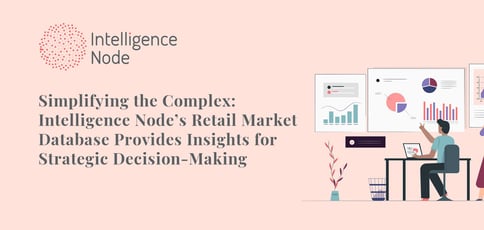
TL; DR: Intelligence Node is on a mission to help retailers compete in the digital economy by leveraging data-driven pricing and merchandising strategies that boost revenue. Using proprietary AI-driven algorithms, the independent data powerhouse compiles highly accurate and comprehensive datasets to optimize decision-making with minimum upkeep. Ultimately, Intelligence Node’s goal is to help forward-thinking retailers adapt to a Google-driven environment where data-driven pricing and assortment planning is no longer optional.
Retailers, prepare your eulogies: Traditional merchandise planning is officially dead.
According to Sanjeev Sularia, CEO and Co-Founder of Intelligence Node, digital transformation has rendered dated, intuition-based strategies useless while ushering in a new era of data-driven pricing and assortment planning.
Sanjeev said he and his co-founders saw the change coming in 2012. In response, the team built a massive database of retail products that would empower brands to integrate lifecycle pricing into their merchandising strategies.
“But we wanted to do even more,” Sanjeev said. “We wanted to give retailers and brands a fighting chance — not only to survive in the age of Amazon but to thrive in it. The goal was to create a complete retail and ecommerce solution that would take care of everything from pricing to assortment.”

Intelligence Node makes price optimization and competitive intelligence accessible to retailers across the globe.
Similar solutions existed on the market from large consultants, such as Mckinsey, BCG, and Bain, and traditional SaaS players like Oracle and SAP. But these companies relied heavily on internal data and failed to address one critical truth: that the consumer can always shop elsewhere.
“That is the hole that we plugged by creating Bloomberg-like software for retail pricing that provides in-depth competitive insights in real time for quality decision-making,” Sanjeev told us.
At a time when pricing decisions are made in minutes, not days, Intelligence Node aims to serve as its customers’ eyes and ears in the market.
“We give you an all-inclusive, easy-to-use solution tailored to your category so you can determine the best pricing, assortment, promotion, and sales strategy criteria based on real-time inventory and attribute information,” Sanjeev said.
Powering Advanced Merchandising Since 2012
Intelligence Node has made a significant impact in the eight years since the company embarked on its journey to compile a comprehensive product and pricing dataset.
Using its AI-powered algorithms, the company has mapped more than 1 billion unique products across more than 190,000 brands and 1,400 product categories. Users can access the real-time data in 29 languages using the company’s InCompetitor dashboard.
Intelligence Node also serves users from a range of industries, including consumer electronics, fashion and apparel, food and grocery, furniture and home decor, and beauty. Sanjeev told us the company’s dataset has helped generate retail revenue of over $600 billion worldwide.
“Intelligence Node is trusted by hundreds of retailers and brands across the globe, including industry leaders like Jockey, Unilever, Macy’s, Li & Fung, GFG, Tesco, Reliance, and Landmark, among others,” he said. “Our competitive solutions allow these companies to grow their retail businesses with data-backed, AI-led pricing optimization.”

Intelligence Node stands out from the pack due to highly accurate data and instant access via APIs.
Intelligence Node’s values include working with a growth mindset and helping companies compete wisely by adapting to emerging trends. Still, Sanjeev said it’s been a challenge convincing retailers to move from intuition-based pricing to a more scientific approach over the years.
“Even today in the retail world, the majority of pricing and assortment decisions are made using gut instinct without having much insight into the market,” he said. “The average response time to a price change for Amazon is one minute. The same blended average for ecommerce in the U.S. is approximately 30 days, whereas for the U.S. brick-and-mortar sector, the blended average is about 270 days.”
According to Sanjeev, Amazon’s dynamic pricing has allowed the company to dominate the marketplace in recent years. “What we are trying to do is help retailers stay ahead of the curve by beating Amazon at its own game,” he said.
Highly Accurate Data and an Easy-to-Integrate API
Intelligence Node delivers a robust product catalog — from software for benchmarking for pricing and assortment to price optimization and datasets provided via APIs. But Sanjeev said the underlying value connecting all of the company’s services are high accuracy and instant plug-and-play access.
“We provide highly accurate and actionable data,” he said. “Whether the retailer is a small company or a giant like Walmart, our solution can be deployed instantly. We offer an API that can be completely integrated with the retailer’s tech stack within minutes.”
The company’s product database API allows retailers to save significant time and money on deployment and integration. To ensure consistency, the technology accepts most product identifiers, including barcodes, global trade item numbers (GTINs), and UPCs. The API returns normalized categories mapped according to Intelligence Node’s proprietary approach to data clustering and normalization.
In addition to easy setup, Sanjeev said the company’s high levels of accuracy also serve as a differentiator. “We host the largest and the most accurate dataset in the market, which has been instrumental in providing significant savings for some of the world’s leading retailers,” he said.
The platform also addresses standardization, a common pain point in the retail world. “To put things into context, we track more than 3,800 variants of the color beige in the Asian lingerie market,” Sanjeev said. “What we offer to our clients is the standardization of this data in their chosen format so that their teams don’t have to learn new taxonomies and ontologies.”
When it comes to product development, Intelligence Node’s processes are based on adapting to the newest trends and, of course, listening to customer feedback.
“While we have a customer success team that is constantly updating product features based on customer feedback manually, our solution is strongly driven by machine learning as well,” Sanjeev said. “With each iteration, our solution adapts itself to the newest trends in the industry. This leads to exponential growth, which is a core driver of our extremely high accuracy.”
Adapting to a Google-Driven Retail Environment
Intelligence Node recently added search engine results page (SERP) and visibility data to its platform so users can tap into the full potential of big data.
“Visibility is an extremely important factor that is often ignored by retailers,” Sanjeev said. “Consumers are constantly searching for products on Google and other search engines before making a purchase decision, whether online or offline. Hence, SERP insights are a pivotal tool for success in retail today.”
Sanjeev said that retailers that do not appear at the top of a page or in the top five listings will have difficulty generating sales. He added that companies with higher page rankings rarely need to rely on discounts or promotions. A high ranking implies that the product is being purchased for reasons other than price, such as quality, brand value, perception, or loyalty.
“A SERP-based product listing approach takes into account the product description, attribute listing, and product image score, among other factors,” he said. “It is a breakthrough for retailers that want to get their products noticed and purchased by customers — and should be central to all marketing efforts.”
HostingAdvice.com is a free online resource that offers valuable content and comparison services to users. To keep this resource 100% free, we receive compensation from many of the offers listed on the site. Along with key review factors, this compensation may impact how and where products appear across the site (including, for example, the order in which they appear). HostingAdvice.com does not include the entire universe of available offers. Editorial opinions expressed on the site are strictly our own and are not provided, endorsed, or approved by advertisers.
Our site is committed to publishing independent, accurate content guided by strict editorial guidelines. Before articles and reviews are published on our site, they undergo a thorough review process performed by a team of independent editors and subject-matter experts to ensure the content’s accuracy, timeliness, and impartiality. Our editorial team is separate and independent of our site’s advertisers, and the opinions they express on our site are their own. To read more about our team members and their editorial backgrounds, please visit our site’s About page.

